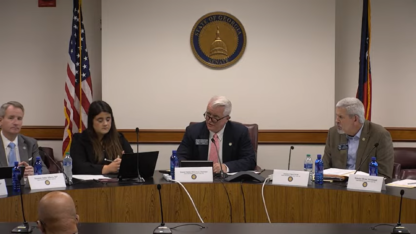Georgia Senate seeks to let voters decide on sports betting in November

Georgians could get a chance in November to vote on authorizing sports gambling after senators approved a state constitutional amendment on Tuesday.
It’s a big step forward for those who want Georgians to be able to bet on pro and college sports after years of being stymied in the Senate. However, the measure still has a long way to go and would require two-thirds approval in the state House before it goes to the ballot.
The Senate voted 41-12 for Senate Resolution 579. It would designate 80% of taxes from sports betting to prekindergarten programs and then to college scholarships, once prekindergarten programs are fully funded. Another 15% of proceeds would go to aiding people with gambling problems, while the remaining 5% would create a fund for Georgia to recruit and fund major sports events.
Some supporters have sought to legalize sports gambling as part of the state lottery without a constitutional amendment. But Republican state Sen. Bill Cowsert of Athens has long said he wants voters to get a say, arguing that when Georgia voters authorized the lottery in 1992, they didn’t believe they were approving sports betting.
“I think it’s the politically appropriate thing to do when we make this type of major policy shift in our state,” Cowsert said. “This is to give voters the opportunity to speak on the issue.”
Sen. Marty Harbin, a Tyrone Republican, said it was a mistake to send sports gambling to the ballot, warning that it’s a ruinously addictive form of gambling.
“The people who vote for the constitutional amendment will not have the knowledge and information that you and I have,” Harbin said.
He said the more than $100 million a year in tax money that sports gambling might raise isn’t worth the problems it would cause, especially when Georgia’s budget is currently flush.
“We have the money,” Harbin said. “We have the No. 1 state to do business in. We have a state that is prosperous.”
The measure passed with relatively little debate after the Senate earlier this year passed a bill that would set up a structure for sports betting as long as a constitutional amendment passes. That measure, though, won only 34 votes, leaving in question whether an amendment could clear the required two-thirds threshold in the Senate.
Nationwide, 38 states allow sports betting. Some states allow only in-person bets, although most allow electronic betting from anywhere. Georgia’s earlier bill would take 20% of proceeds in taxes, after winnings are paid to gamblers. Nationwide, tax rates are set at anywhere from 6.75% in Iowa to 51% in Rhode Island and New York.
Lawmakers continue to maneuver over gambling, though, with supporters of casinos and betting on horse racing seeking to push their causes forward by linking them to sports betting. Sen. Carden Summers, a Cordele Republican, for example, argued to other senators Tuesday that lawmakers should give voters a chance to remove all prohibitions on gambling from the state constitution, not just the prohibition on sports betting. That would clear the way for casinos, which Summers favors.
That maneuvering, along with Democrats’ unwillingness to provide needed votes in the face of moral opposition to gambling from some Republicans, has killed efforts in previous years.
Senate Minority Gloria Butler, a Stone Mountain Democrat, said her party agreed to go along with the plan this time in part because it prioritizes money for prekindergarten. Butler, for example, said she’d like to see the state expand its program to cover more 3-year-olds in addition to 4-year-olds.
“Why not start at 3 years old?” Butler asked.








